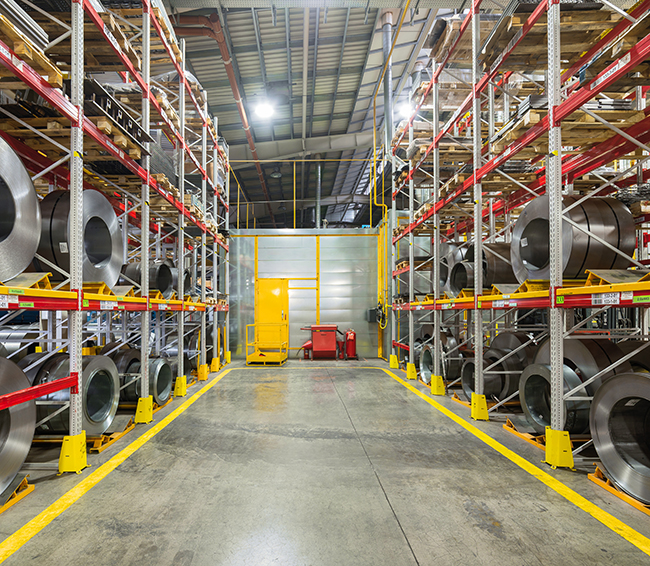Ask people within the industry what makes a successful manufacturer and they will point to many factors. Hiring good people and treating them with respect. Building long-term relationships with their customers. Delivering quality products on time every time. Keeping up to date with evolving technologies. Continually striving to improve their work processes. The list goes on and on, but two factors stand head and shoulders above the rest – a passion for manufacturing and making your Enterprise Resource Planning (ERP) software the heartbeat of your business. Successful manufacturers love to design and build products that help make the world a better place. They welcome the challenges inherent in the manufacturing environment and thrive on finding new and better ways to overcome them. It’s something the best manufacturers develop from an early age, and they never seem to tire of it.
Next comes a deep understanding of the importance ERP software brings to the technology-driven manufacturing era. ERP is not merely a tool; it’s the vital pulse that sustains and nurtures the lifeblood of modern manufacturing companies. In an industry characterized by rapid technological advancements, global competition, and ever-evolving consumer demands, ERP has emerged as the central nervous system of manufacturing operations, integrating every facet from production to financials to customer service. Successful manufacturers recognize ERP as the most valuable asset in their business and they treat it accordingly, constantly seeking to develop ERP knowledge and expertise throughout the organization. This whitepaper dives into why ERP software is indispensable for today’s manufacturers, examining its profound impact on cash flow, profitability, growth, customer satisfaction, and employee retention and morale.

What is ERP Software?
ERP software is an integrated suite of applications designed to simplify and automate core business processes from production, inventory management and finance to customer relationship management (CRM). By unifying these disparate functions into a single cohesive system, ERP software provides real-time visibility into operations, enabling manufacturers to make informed decisions, enhance efficiency, and drive continuous improvement.
The benefits of ERP software are substantial. However, ERP is only as good as your implementation of the system and ongoing continuous improvement. Poor system use can put the brakes on the success of your manufacturing enterprise. For example, incorrect data transfers from your previous system, insufficient training, failure to sync the ERP with your production processes, and lack of procedures for using the software can result in:
- Disrupted operations, causing downtime, production delays, missed deliveries, erosion of customer trust, and lost revenue
- Cost overruns that can spiral out of control, strain your budgets, and shrink profitability.
- Employee resistance that creates friction, reduces productivity, and fosters a negative work atmosphere.
The benefits of ERP software can only be achieved through careful planning, effective implementation, and ongoing management. Successful manufacturers invest in the right ERP solution that aligns with their unique needs while ensuring employees are well-trained and engaged throughout the process. Only then can you harness the full potential of ERP systems and achieve sustainable success for your business.
Here are some of the many ways ERP software simplifies your manufacturing and drives the growth of your business.

Improve Cash Flow Management
Efficient cash flow management is crucial for sustainable manufacturing success. A well-implemented ERP system plays a pivotal role in optimizing cash flow in several ways:
- Real-time financial insights. ERP software’s real-time access to financial data enables manufacturers to accurately monitor cash inflows and outflows – an immediate visibility that helps identify potential cash flow issues before they escalate into major problems. With ERP’s seamless integration of accounting, job costing, payroll, and other modules you can generate timely financial reports, track expenses, and forecast future cash flows.
- Automated billing and collections. ERP reduces the time and effort required to manage accounts receivable by automating billing, invoicing and collections processes that facilitate quicker payments. Your business will benefit from
improved cash conversion cycles and reduced days sales outstanding (DSO). - Inventory optimization. Excess inventory ties up valuable cash resources, while stockouts lead to lost sales and dissatisfied customers. An ERP system equipped with advanced inventory management capabilities helps you strike the right balance for optimal cash flow and material inventory. Automatic purchasing, RFID technology, real-time inventory tracking and other features enable you to maintain ideal stock levels, minimize carrying costs, and free up cash for other critical investments.
Enhance Your Profitability
Profitability is the ultimate measure of a manufacturer’s success. ERP software contributes significantly to your profitability through enhancement of three essential shop floor activities.
- Streamlined production processes. ERP systems create a seamless workflow from raw materials to finished products by integrating production planning, scheduling, and shop floor data collection. They minimize downtime and maximize throughput by optimizing production schedules and correctly prioritizing jobs. Real-time data from your ERP software allows you to quickly identify production bottlenecks and implement corrective measures for higher output and increased profitability.
- Accurate job costing. Knowing your true job costs is paramount for competitive pricing that maintains healthy profit margins. ERP systems provide detailed insights into the costs associated with each job, including Freight, Labor, Overhead, Outside Services, Other Services, and Material. Accurate job costing facilitates informed pricing decisions, identifies cost-saving opportunities, and eliminates costly inefficiencies.
- Quality control. Consistently delivering high-quality products builds a reputable brand and reduces warranty claims. ERP software integrates quality control processes into the production lifecycle, enabling your team to perform inspections, track defects, and implement corrective actions in real-time. Maintaining stringent quality standards helps reduce rework, minimize waste, and enhance customer satisfaction – all of which contribute to higher profitability.
Drive Growth
Every manufacturer wants to grow their business. ERP software acts as a catalyst for growth by providing the agility, intelligence and scalability needed to expand operations, enter new markets, and innovate.
- Scalability and flexibility. As a manufacturing enterprise grows, its operational complexities increase. ERP systems are designed to scale with the business by accommodating additional users, locations, and products without compromising performance. Whether expanding production capacity, adding new product lines, or entering international markets, ERP software provides the flexibility to adapt your business to continually changing needs.
- Data-driven decision making. In an increasingly complex manufacturing environment, decisions based on accurate and timely information are crucial for growth. ERP systems can consolidate data from both internal and external sources to offer a holistic view of your business. Sales data can be analyzed to pinpoint high-performing products, while production data can reveal opportunities for process optimization. Advanced analytics and dashboards enable your management team to identify trends, uncover insights, and make strategic decisions that drive growth.
- Innovation and product development. In manufacturing, innovation is the linchpin of sustained growth. ERP software supports innovation by simplifying engineering and product development processes. Features such as bill of materials (BOM) management, CAD interface, and product configurators facilitate efficient design, prototyping, and testing of new products. By accelerating time-to-market and reducing development costs, ERP systems empower you to stay ahead of the competition and capture new market opportunities.
Elevate Customer Satisfaction
Satisfied customers are a key driver of loyalty and repeat business. ERP software enhances customer satisfaction by enabling your business to deliver high-quality products on time, every time. Three main drivers of customer satisfaction are:
- Order management and fulfillment. Ensuring timely and accurate order fulfillment helps build trust and foster longterm relationships with your customers. ERP systems provide a seamless order-to-delivery process by integrating order management, eCommerce, and CRM functionalities that keep customers informed and satisfied.
- Personalized customer service. Delivering personalized experiences requires understanding customer needs and preferences. ERP software captures and analyzes customer data so you can tailor your offerings and services accordingly. Whether providing customized quotes, recommending complementary products, or addressing specific customer concerns, ERP empowers you to exceed customer expectations.
- Consistent product quality. Reliable product quality is a cornerstone of customer satisfaction. ERP systems integrate quality control processes into the production lifecycle, ensuring that products meet stringent quality standards. By minimizing defects and rework, you can deliver products that consistently meet or exceed customer expectations, leading to higher satisfaction and loyalty.
Boost Employee Retention and Morale
A motivated and engaged workforce is a winning workforce. ERP software enhances employee retention and morale by providing the tools and environment needed for productivity, collaboration, and professional growth.
- Streamlined workflows. ERP systems liven up the work atmosphere by automating routine and repetitive tasks, reducing the administrative burden on employees allowing them to focus on higher-value activities. Streamlined workflows enhance productivity and job satisfaction by enabling employees to work more efficiently and achieve better results.
- Training and development. Continuous learning and development opportunities are essential for employee growth and retention. ERP software includes training and
learning management modules that facilitate knowledge sharing, skills development, and career progression. Investing in employee training will cultivate a skilled and loyal workforce for your business. - Transparent communication. ERP supports a positive work environment by providing real-time access to information and facilitating transparent communication across
departments. Employees can collaborate more effectively, share insights, and align their efforts with organizational goals, thereby boosting morale and fostering a sense of belonging and purpose throughout your organization.
Win Customers
Not only does ERP software simplify your business and significantly improve efficiency, it can also do the same for your customers. Features like electronic data change (EDI), BOM Compare, CAD interface and Product Configurator enable you to process orders quickly and accurately, provide short lead times and deliver on time, every time. In doing so, companies that buy from you become loyal customers who rely on your production times,
delivery and personalized service.
ERP software is undeniably the heartbeat of any successful manufacturer. Its impact on cash flow, profitability, growth, customer satisfaction, and employee retention and morale cannot be overstated. By integrating and automating core business processes, ERP systems empower manufacturers to operate efficiently, make informed decisions, and thrive in a competitive landscape.
For more information on ERP software and how it can transform your manufacturing, visit Global Shop Solutions.




